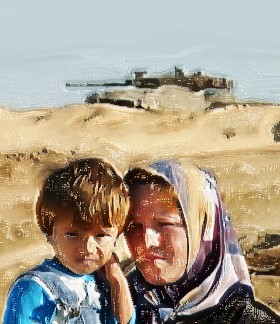In Lenin’s Tomb, there is a cogent discussion about the phenomenon of suicide bombing:
Luca Ricolfi notes (Gambetta, 2005) that despair of a very particular kind is certainly an animating factor in Palestinian suicide bombings. Citing research by a Palestinian economist, B. Saleh, which shows almost all suicide bombers having been subjected directly to arrest or maltreatment by the IDF, and a good number having had a family member killed, he notes that compounding the desire for revenge is indifference to death. That is, the extreme repression in Palestine produces a “drastic, extreme and tragic contraction of an individual’s set of options”. Material deprivation leaves individuals with “literally nothing to do or imagine”, while specific repression can “generate a progressive dismantling of a person’s emotional world” in which “reality has shrunk to a minimum” and is replaced by a highly mental world of symbols and fantasies. Here, liberal economic theory does not hold: man does not always pursue his own immediate interests in such a situation, and such a society. The moral priority of the community over the individual can lead people thus deprived to be willing to sacrifice themselves. Other research produces similar conclusions, as Jacqueline Rose notes:
According to Eyad El-Sarraj, the founder and director of the Gaza Community Mental Health Programme, today’s suicide attackers are, for the most part, children of the first intifada. Studies show that during the first uprising, 55 per cent of children saw their fathers being humiliated or beaten by Israeli soldiers. Martyrdom – sacrificing oneself for God – increases its appeal when the image of the earthly father bites the dust. ‘It’s despair,’ El-Sarraj states baldly, ‘a despair where living becomes no different from dying.’ When life is constant degradation, death is the only source of pride. ‘In 1996, practically all of us were against the martyr operations,’ Kamal Aqeel, the acting mayor of Khan Yunis in Gaza, explains. ‘Not any longer . . . We all feel that we can no longer bear the situation as it is; we feel that we’d simply explode under all this pressure of humiliation.’
Israel creates despair amongst those whom it steals life, liberty and land.
… what we appear to have is injustice generating recruits for unjust actions.
Since the Israeli fascists constructed the fence around Gaza, the level of oppression has been ramped up.
Barak rants and boast about ‘smashing’ and ‘crushing’ whilst Olmert glowers with ‘disproportionate responses’ and rabbis urge militant jihad. Can the golems of Israel threaten and execute collective punishment of the hapless civilians of Gaza with impunity in perpetuity?
At some point, there will be a terrible price to pay.






 Leaves from the past swirl about my shattered country
Leaves from the past swirl about my shattered country The ancient bus lurched its winding way to the leafy, well-to-do suburb by the sea. She walked to the plaza and sat on a bench. Amirah pretended to examine something in her satchel as she set the timer.
The ancient bus lurched its winding way to the leafy, well-to-do suburb by the sea. She walked to the plaza and sat on a bench. Amirah pretended to examine something in her satchel as she set the timer.